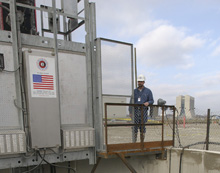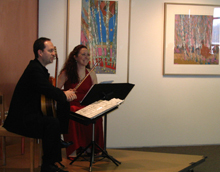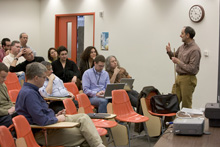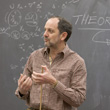 |
Wednesday, January 25
11:00 a.m.
Fermilab ILC R&D Meeting -
1 West
Speaker: H. Carter, Fermilab
Title: Summary of the ILC Cryomodule Working Group
Meeting held at CERN
3:30 p.m.
Director's Coffee Break -
2nd Flr X-Over
4:00 p.m.
Fermilab Colloquium -
1 West
Speaker: F. Rasio, Northwestern University
Title: The Million-Body Problem: Particle Simulations
in Astrophysics
Thursday, January 26
2:30 p.m.
Theoretical Physics Seminar -
Curia II
Speaker: E. Lunghi, Fermilab
Title: Analysis of Large Tanbeta Effects in the MSSM
from the GUT Scale
3:30 p.m.
Director's Coffee Break -
2nd Flr X-Over
4:00 p.m.
Accelerator Physics and Technology Seminar -
1 West
Speaker: L. Prost, Fermilab
Title: Progress of Electron Cooling at the Recycler
|



Wednesday, January 25
- Portabello Harvest Grain
- Santa Fe Chicken Quesadilla
- Garlic Herb Roasted Pork
- Beef Stroganoff
- Triple Decker Club
- Meatlover's Pizza
- Pesto Shrimp Linguini w/Leeks & Tomatoes
The Wilson Hall Cafe accepts Visa, Master Card, Discover and American Express.
Wilson Hall Cafe Menu
|
 |
Wednesday, January 25
Lunch
-Poached Salmon with Scallion Sauce
-Vegetable Medley
-Long Grain Rice
-Yogurt Cake with Raspberry Sauce
Thursday, January 26
Dinner
-French Onion Soup
-Grilled Swordfish with Tomato White Butter Sauce
-Broccoli with Lemon Zest
-Saffron Rice
-Marzipan with Chocolate Sauce
Chez Leon Menu
Call x4512 to make your reservation.
|


|  |
| NuMI Project Nominated for Prestigious OCEA Award |
 |
| Project manager, Greg Bock, at the NuMI target shaft at Fermilab. A 120-foot-long cavern is located 350 feet below the surface of Fermilab's campus, with access by an elevator traveling the equivalent of a 30-story building. (Click image for larger version.) |
|
The Neutrinos at the Main Injector Project was recently selected as one of five worldwide finalists in the 2006 Outstanding Civil Engineering Achievement competition. The annual OCEA award, given by the American Civil Engineering Society, recognizes superior civil engineering feats that contribute to engineering progress in society.
The $170-million NuMI project, which seeks to determine neutrino mass and other properties, began operation in March, 2005. The project sends an underground neutrino beam 435 miles from Fermilab to the Soudan mine shaft in Northern Minnesota. After leaving Fermilab's Main Injector, neutrinos filter through a 1,000-ton underground detector on site, and then travel through solid bedrock to a 6,000-ton "far" detector at the Soudan facility, located 2,340 feet below ground level. "I still consider it a treat each time I visit the underground site," said project manager Greg Bock. "It took over a million hours to complete this project, and this is a real tribute to the ability of everyone who worked on it." Bock acknowledged the hundreds of people from the lab and various construction companies who were involved in building the facility, which serves more than 200 scientists, engineers, technical specialists and graduate students from 32 institutions from around the world.
The OCEA winner will be announced April 26 at the seventh annual Outstanding Projects and Leaders gala in Washington D.C. "The 2006 finalists are outstanding examples of how civil engineering can contribute to a community's economic success, improve residents' quality of life and facilitate scientific progress," said ASCE Executive Director Patrick J. Natale. "Every finalist is to be congratulated for their incredible achievements." Last year's winner was the world's longest cable-stayed bridge; at 2,225 meters, it provides the only man-made link between Peloponnese and mainland Greece. "This is a huge honor," said Jed Brown, Associate Director for Operations Support at Fermilab. "Congratulations to all who worked on this project. The whole lab should feel proud."
— Siri Steiner
|

 |
| The Cavatina Duo performed for a sold out audience in the Fermilab gallery on Sunday. The concert was part of the Gallery Chamber Series. The Callipygian Players and the The Three Celli, which are also on the docket, have sold out as well.
(Click on image for larger version.) |
|

Scientific American,
February, 2006 Issue:
Plasma Accelerator: A new method of particle acceleration in which the particles "surf" on a wave of plasma promises to unleash a wealth of applications
Physicists use particle accelerators to answer some of the most profound questions about the nature of the universe. These gargantuan machines accelerate charged particles to nearly the speed of light and then smash them together, re-creating the conditions that existed when our universe was cataclysmically born in the big bang. By analyzing the debris of the collisions, physicists hope to understand how the seemingly disparate forces and particles that exist in our universe are all connected and described by a unified theory. Unfortunately, as they get closer and closer to solving this mystery of creation, physicists need particle accelerators of ever greater power (and expense).
Read More
|
|
 |
CMS Physicists Discuss
Software at Fermilab
|
 |
| CMS physicists met at Fermilab to coordinate progress on the CMS tracker software. (Click image for larger version.) |
|
Last week, the CMS experiment moved a little closer to Fermilab. About 60 members of the CMS collaboration, the majority of them from Europe, came to Fermilab for a four-day workshop on the CMS Final Tracker Software. "There are about 500 people all over the world working on CMS Tracker," explained Guido Tonelli of the University of Pisa, the CMS deputy project manager for the tracker.
 |
| Guido Tonelli |
"The workshop at Fermilab brought together the people working on the software. Prior to the meeting, many participants only knew each other by name. Now they can associate faces and real people with the names."
The meeting was held at Fermilab's LHC Physics Center because of the strong CMS tracking group at the lab. "It was quite natural to hold the meeting here," said Lucia Silvestris, of INFN Bari, who coordinates the software development for the entire CMS detector together with Fermilab's Avi Yagil. "Most of the participants were from the U.S. and Italy," Silvestris continued. "We had many student participants who are preparing the software that is needed to read the data."
The main goal of the workshop was to coordinate work assignments, with many students taking on responsibilities and functions such as working group conveners. To be ready for the startup of the LHC in 2007, the CMS collaboration has to commission the detector and its software this year. Several detector components are already being tested using cosmic rays or test beams. For the tracker, the goal is to have 25 percent integration by early summer. "The areas we need help are well identified," said Tonelli. "We now think it is realistic to get the work done. The issue is manpower."
— Kurt Riesselmann
|

Fermilab Today Survey
On January 12, the University of Chicago Survey Lab contacted all Fermilab employees by email, providing a link to the Fermilab Today online survey. If you have not yet completed the survey, please take 10 to 15 minutes of your time to answer the questions. Click on the link provided in the email from Kelly Daley of the Survey Lab. (If clicking doesn't work, please copy the entire link as one line into a Web browser.) A Fermilab Today story published on January 10 provides more information on the survey.
International Folk Dancing
International Folk Dancing will meet Thursday, January 25, at Kuhn Barn on the Fermilab site. Dancing begins at 7:30 p.m. with teaching and children's dances earlier in the evening and request dancing later on. Newcomers are welcome and you do not need to come with a partner. Info at 630-584-0825 or 630-840-8194 or folkdance@fnal.gov.
Summer Housing Requests
The Fermilab Housing Office is now taking requests for houses, apartments,
and dormitory rooms for the Summer of 2006. Since there will be a large influx
of experimenters, and requests are anticipated to be in excess of our available
facilities, you are urged to submit your request for reservations to the
Housing Office by Wednesday, March 1, 2006. Requests can be made for
any period and need not commence on any particular date. For further information, please contact the Housing Office at:
call (630) 840-3777 or
email housing@fnal.gov
Individual housing requests can be made by using our Online Housing Request
form on our website.
Pheasant Run Outing
The Fermilab Recreation Office offers an adult outing with buffet dinner and theater. Pheasant Run Resort & Spa presents “Accomplice” by Rupert Holmes, Saturday, March 4.
The price of $35.00/person includes the dinner buffet and theater, taxes and gratuity. Call or stop by the Recreation Office x5427, x2548 to pick up a brochure and registration form.
Deadline is February 17. More information can be found on the Recreation Web page.
Upcoming Activities
|
|



